#robert price
Explore tagged Tumblr posts
Text








'The Hunchback of Notre Dame' 1923. Models.
2 notes
·
View notes
Text
Lovecraft: Fear of the Unknown (2020)
youtube
A chronicle of the life, work and mind that created the Cthulhu mythos.
#john carpenter#Caitlin R. Kiernan#neil gaiman#s.t. joshi#andrew migliore#peter straub#robert price#guillermo del toro#ramsey campbell#videos#lovecraft#movies#stuart gordon#books#1920s#1910s#1930s
4 notes
·
View notes
Text
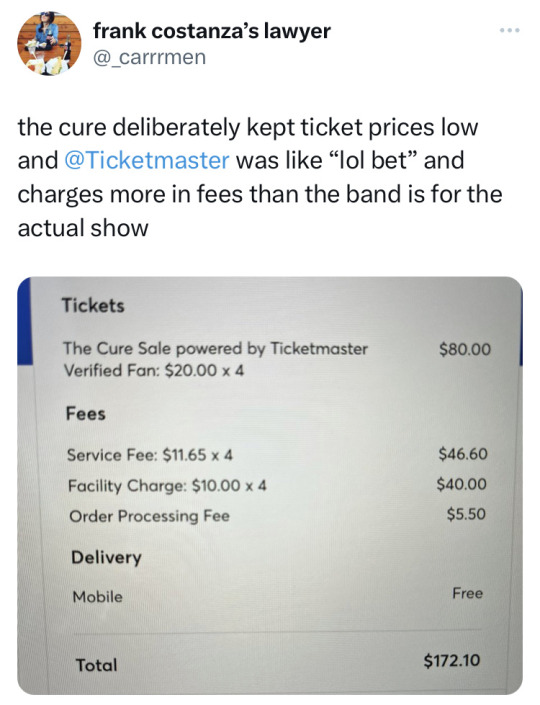
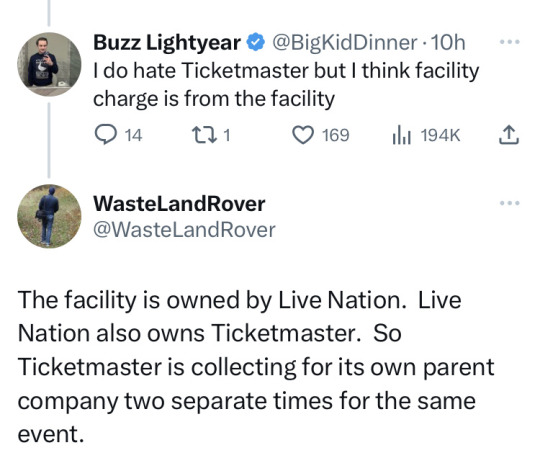
🎫 15 March 2023 X
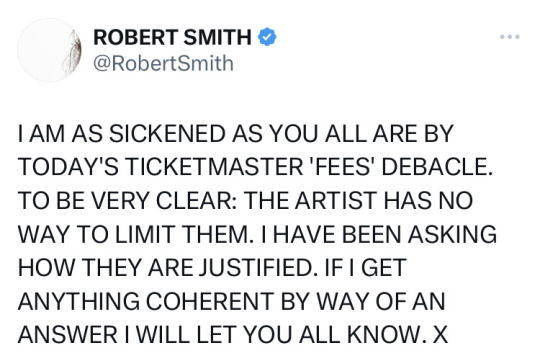
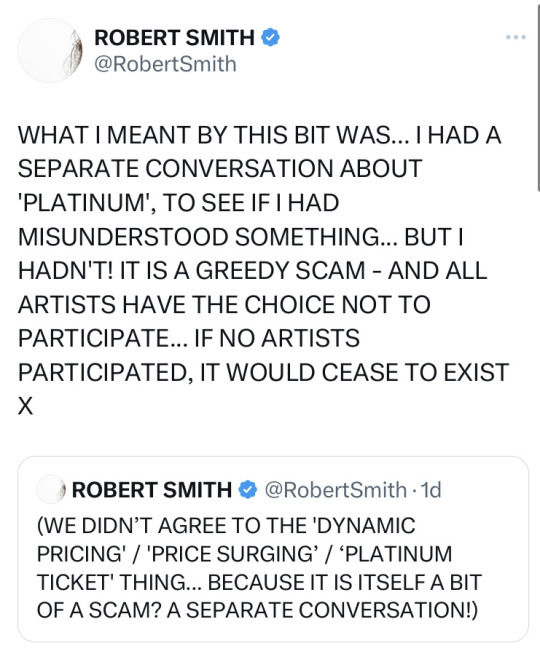
🎫 Robert Smith from The Cure tweeted about ticket prices and Ticketmaster's extra fees. He also tweeted about the verified fan process. 14/15 March 2023 x
X
#it facinates me how they have gotten away with it for so long#artists can say no#real bloodsuckers#Ticketmaster#live nation#$20 tickets is so so cheap#ticket prices#ticket fees#the cure#Robert smith#Louis Tomlinson#15 March 2023#14 March 2023#mine
22K notes
·
View notes
Text
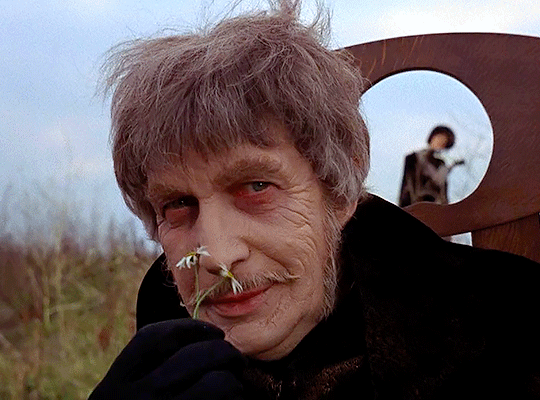

The Abominable Dr. Phibes (1971)
#Horror#Filmedit#Horroredit#The Abominable Dr. Phibes#Robert Fuest#Vincent Price#Dr. Anton Phibes#CHB#1971#70s
1K notes
·
View notes
Text


When it comes to spooky movies, Vincent Price reigns supreme as the ultimate icon. He wore this fabulous yellow damask costume as Lord Edward Whitman in the 1970 𝑪𝒓𝒚 𝒐𝒇 𝒕𝒉𝒆 𝑩𝒂𝒏𝒔𝒉𝒆𝒆. However, like many B horror films, the costumes were not created specifically for the movie, and this particular piece originated with the 1966 adaptation of 𝑨 𝑴𝒂𝒏 𝒇𝒐𝒓 𝑨𝒍𝒍 𝑺𝒆𝒂𝒔𝒐𝒏𝒔, where it was worn by Robert Shaw as King Henry VIII. This costume has been used in other films as well. To find out where visit our website: bit.ly/TudEliz214
#vincent price#cry of the banshee#a man for all seasons#robert shaw#costume#costumes#costume drama#horror#halloween#halloween costume#halloweeneveryday#31daysofhalloween
218 notes
·
View notes
Text

Vincent Price - The Abominable Dr. Phibes (1971)
197 notes
·
View notes
Text

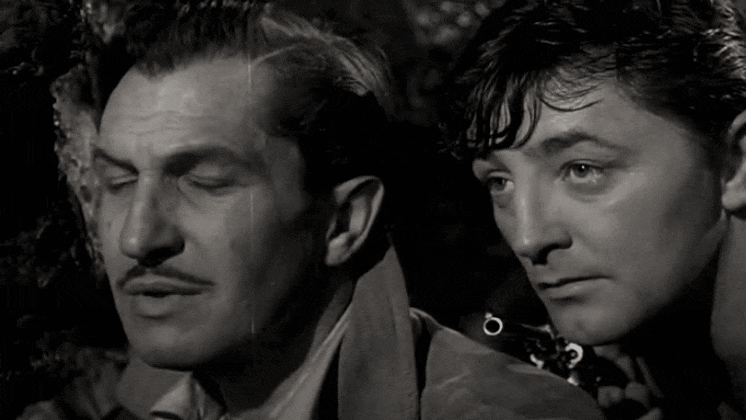
Vincent Price and Robert Mitchum
His Kind of Woman (1951)
#vincent price#robert mitchum#his kind of woman#i fucking love this scene#go off vincent!!#i ADORE him#hes so goddamn gorgeous#those lips....#did he know?#he makes me fucking feral#he makes me feel things#bicon#bisexual#god#horror#old horror movies#vintage#movie#actor#handsome#gif#gifs made by me#gif set
405 notes
·
View notes
Text
The health industry’s invisible hand is a fist
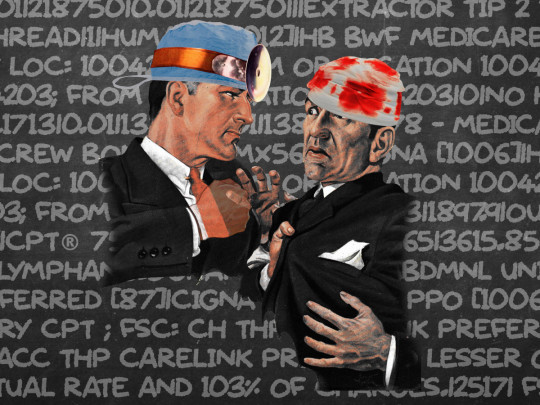
On June 21, I'm doing an ONLINE READING for the LOCUS AWARDS at 16hPT. On June 22, I'll be in OAKLAND, CA for a panel and a keynote at the LOCUS AWARDS.

The US has the rich world's most expensive health care system, and that system delivers the worst health outcomes of any country in the rich world. Also, the US is unique in relying on market forces as the primary regulator of its health care system. All of these facts are related!
Capitalism's most dogmatic zealots have a mystical belief in the power of markets to "efficiently allocate" goods and services. For them, the process by which goods and services are offered and purchased performs a kind of vast, distributed computation that "discovers the price" of everything. Our decisions to accept or refuse prices are the data that feeds this distributed computer, and the signals these decisions send about our desires triggers investment decisions by sellers, which guides the whole system to "equilibrium" in which we are all better off.
There's some truth to this: when demand for something exceeds the supply, prices tend to go up. These higher prices tempt new sellers into the market, until demand is met and prices fall and production is stabilized at the level that meets demand.
But this elegant, self-regulating system rarely survives contact with reality. It's the kind of simplified model that works when we're hypothesizing about perfectly spherical cows of uniform density on a frictionless surface, but ceases to be useful when it encounters a messy world of imperfect rationality, imperfect information, monopolization, regulatory capture, and other unavoidable properties of reality.
For members of the "efficient market" cult, reality's stubborn refusal to behave the way it does in their thought experiments is a personal affront. Panged by cognitive dissonance, the cult members insist that any market failures in the real world are illusions caused by not doing capitalism hard enough. When deregulation and markets fail, the answer is always more deregulation and more markets.
That's the story of the American health industry in a nutshell. Rather than accepting that people won't shop for the best emergency room while unconscious in an ambulance, or that the "clearing price" of "not dying of cancer" is "infinity," the cult insists that America's worst-in-class, most expensive health system just needs more capitalism to turn it into a world leader.
In the 1980s, Reagan's court sorcerers decreed that they could fix health care with something called "Prospective Payment Systems," which would pay hospitals a lump sum for treating conditions, rather than reimbursing them for each procedure, using competition and profit motives to drive "efficiency." The hospital system responded by "upcoding' patients: if you showed up with a broken leg and a history of coronary disease, they would code you as a heart patient and someone who needed a cast. They'd collect both lump sums, slap a cast on you, and wheel you out the door:
https://www.ncbi.nlm.nih.gov/pmc/articles/PMC4195137/
As Robert Kuttner writes for The American Prospect, this kind of abuse was predictable from the outset, especially since Health and Human Services is starved of budget for auditors and can only hand out "slaps on the wrist" when they catch a hospital ripping off the system:
https://prospect.org/economy/2024-06-13-fantasyland-general/
Upcoding isn't limited to Medicare fraud, either. Hospitals and insurers are locked in a death-battle over payments, and hospitals' favorite scam is sending everyone to the ER, even when they don't have emergencies (some hospitals literally lock all the doors except for the ER entrance). That way, a normal, uncomplicated childbirth can be transformed into a "Level 5" emergency treatment (the highest severity of emergency) and generate a surprise bill of over $2,700:
https://pluralistic.net/2021/10/27/crossing-a-line/#zero-fucks-given
The US health industry is bad enough to generate a constant degree of political will for change, but the industry (and its captured politicians and regulators) is also canny enough to dream up an endless procession of useless gimmicks designed to temporarily bleed off the pressure for change. In 2018, HHS passed a rule requiring hospitals to publish their prices.
Hospitals responded to this with a shrewd gambit: they simply ignored the rule. So in 2021, HHS made another rule, creating penalties for ignoring the first rule:
https://www.cms.gov/priorities/key-initiatives/hospital-price-transparency/hospitals
The theory here was that publishing prices would create "market discipline." Again, this isn't wholly nonsensical. To the extent that patients have nonurgent conditions and the free time to shop around, being able to access prices will help them. Indeed, if the prices are in a standards-defined, machine-readable form, patients and their advocates could automatically import them, create price-comparison sites, leaderboards, etc. None of this addresses the core problem that health-care is a) a human right and b) not a discretionary expense, but it could help at the margins.
But there's another wrinkle here. The same people who claim that prices can solve all of our problems also insist that monopolies are impossible. They've presided over a decades-long assault on antitrust law that has seen hospitals, pharma companies, insurers, and a menagerie of obscure middlemen merge into gigantic companies that are too big to fail and too big to jail. When a single hospital system is responsible for the majority of care in a city or even a county, how much punishment can regulators realistically subject it to?
Not much, as it turns out. Kuttner describes how Mass Gen Brigham cornered the market on health-care in Boston, allowing it to flout the rules on pricing. In addition to standard tricks – like charging self-pay patients vastly more than insured payments (because individuals don't have the bargaining power of insurers), Mass Gen Brigham's price data is a sick joke.
See for yourself! The portal will send you giant, unstructured, ZIPped text files filled with cryptic garbage like:
ADJUSTABLE C TAPER NECK PLUS|1|UNITED HEALTHCARE [1016]|HB CH UNITED HMO / PPO / INDEMNITY [34]|UNITED HEALTHCARE HMO [101604]|75|Inv Loc: 1004203; from OR location 1004203|52.02|Inpatient PAF; 69.36% Billed|75|Inv Loc: 1004203; from OR location 1004203|56.87|Outpatient PAF; 75.83% Billed
https://www.massgeneralbrigham.org/en/patient-care/patient-visitor-information/billing/cms-required-hospital-charge-data
These files have tens of thousands of rows. As a patient, you are meant to parse through these in order to decide whether you're getting ripped off on that HIP STEM 16X203MM SIZE 4 FEMORAL PRESS FIT NEUTRAL REVISION TITANIUM you're in the market for (as it happens, I have two of these in my body).
Kuttner describes the surreal lengths he had to go through to prevent his mother from getting ripped off by Mass Gen through an upcoding hustle. By coding her as "admitted for observation," Mass Gen was able to turn her into an outpatient, with a 20% co-pay (this is down to a GW Bush policy that punishes hospitals that charge Medicare for inpatient care when they could be treated as outpatients – hospitals reflexively game the system to make every patient an outpatient, even if they have overnight hospital stays).
Kuttner's an expert on this: he was national policy correspondent for the New England Journal of Medicine and covers the health beat for the Prospect. Even so, it took him ten hours of phone calls to two doctors' offices and Blue Cross to resolve the discrepancy. The average person is not qualified to do this – indeed, the average person won't even know they've been upcoded.
Needless to say that people in other countries – countries where health care is cheaper and the outcomes are better – are baffled by this. Canadians, Britons, Australians, Germans, Finns, etc do not have to price-shop for their care. They don't have to hawkishly monitor their admission paperwork for sneaky upcodes. They don't have to spend ten hours on the phone arguing about esoteric billing practices.
In a rational world, we'd compare the American system to the rest of the world and say, "Well, they've figured it out, we should do what they're doing." But in good old U-S-A! U-S-A! U-S-A!, the answer to this is more prices, more commercialization, more market forces. Just rub some capitalism on it!
That's where companies like Multiplan come in: this is a middleman that serves other middlemen. Multiplan negotiates prices on behalf of insurers, and splits the difference between the list price and the negotiated price with them:
https://www.nytimes.com/2024/04/07/us/health-insurance-medical-bills.html
But – as the Arm and a Leg podcast points out – this provides the perverse incentive for Multiplan to drive list prices up. If the list price quintuples, and then Multiplan drives it back down to, say, double the old price, they collect more money. Meanwhile, your insurer sticks you with the bill, over and above your deductible and co-pay:
https://armandalegshow.com/episode/multiplan/
The Multiplan layer doesn't just allow insurers to rip you off (though boy does it allow insurers to rip you off), it also makes it literally impossible to know what the price is going to be before you get your procedure. As with any proposition bet, the added complexity is there to make it impossible for you to calculate the odds and figure out if you're getting robbed:
https://pluralistic.net/2022/05/04/house-always-wins/#are-you-on-drugs
Multiplan is the purest expression of market dynamics brainworms I've yet encountered: solving the inefficiencies created by the complexity of a system with too many middlemen by adding another middle-man who is even more complex.
No matter what the problem is with America's health industry, the answer is always the same: more markets! Are older voters getting pissed off at politicians for slashing Medicare? No problem: just create Medicare Advantage, where old people can surrender their right to government care and place themselves in the loving hands of a giant corporation that makes more money by denying them care.
The US health industry is a perfect parable about the dangers of trusting shareholder accountable markets to do the work of democratically accountable governments. Shareholders love monopolies, so they drove monopolization throughout the health supply chain. As David Dayen writes in his 2020 book Monopolized the pharma industry monopolized first, and put the screws to hospitals:
https://pluralistic.net/2021/01/29/fractal-bullshit/#dayenu
Hospitals formed regional monopolies to counter the seller power of consolidated Big Pharma. That's Mass Gen's story: tapping the capital markets to buy other hospitals in the region until it became too big to fail and too big to jail (and too big to care). Consolidated hospitals, in turn, put the screws to insurers, so they also consolidated, fighting Big Hospital's pricing power.
Monopoly at any point in a supply chain leads to monopoly throughout the supply chain. But patients can't consolidate (that's what governments are for – representing the diffuse interests of people). Neither can health workers (that's what unions are for). So the system screwed everyone: patients paid more for worse care. Health workers put in longer hours under worse conditions and got paid less.
Kuttner describes how his eye doctor races from patient to patient "as if he was on roller skates." When Kuttner wrote him a letter questioning the quality of care, the eye doctor answered that he understood that he was giving his patients short shrift, but explained that he had to, because his pay was half what he needed, relegating him to a small apartment and an old car. The hospital – which skims the payments he gets for care – sets his caseload, and he can't turn down patients.
The answers to this are obvious: get markets out of health care. Unionize health workers. Give regulators the budgets and power to hold health corporations to account.
But for market cultists, all of that can't work. Instead, we have to create more esoteric middlemen like "pharmacy benefit managers" and Multiplan. We need more prices to shovel into the market computer's data-hopper. If we just capitalism hard enough, surely the system will finally work…someday.

If you'd like an essay-formatted version of this post to read or share, here's a link to it on pluralistic.net, my surveillance-free, ad-free, tracker-free blog:
https://pluralistic.net/2024/06/13/a-punch-in-the-guts/#hayek-pilled
#billing codes#health#corruption#ripoffs#arm and a leg podcast#robert kuttner#prices#austrian economics#Prospective Payment Systems#the invisible hand#shop around#a market for lemons#monopoly#monopolization#upcoding
237 notes
·
View notes
Text

The Abominable Dr. Phibes (1971)
#the abominable dr. phibes#vincent price#dr. phibes#1970s horror#1970s movies#1971#robert fuest#black comedy#horror
127 notes
·
View notes
Text
𝑝𝑒𝑜𝑝𝑙𝑒 𝑖 𝑤𝑟𝑖𝑡𝑒 𝑓𝑜𝑟.



OUTER BANKS.
jj maybank, rafe cameron, pope heyward, sarah cameron

SURVIVING SUMMER.
baxter radic, marlon sousa

THE WALKING DEAD.
benjamin (twd), glenn rhee, rick grimes, daryl dixon

SCHOOL SPIRITS.
wally clark

911.
evan buckley

MARVEL.
peter parker (all), captain america

TOP GUN.
jake seresin, bradley bradshaw, robert floyd, natasha trace

LIFE IS STRANGE.
chloe price, warren graham, rachel ambers, ryan lucan, alex chen, steph gingrich

RED DEAD REDEMPTION.
arthur morgan, sadie adler

THE DOLAN TWINS.
grayson dolan, ethan dolan

SHAMELESS.
lip gallagher

THE MAZE RUNNER.
minho, thomas, gally

THE QUARRY.
jacob custos, max brinly, nicholas furcillo

UNTIL DAWN.
josh washington, jessica riley, mike munroe, emily davis, sam giddings, ashley brown, chris hartley, matthew taylor

TEEN WOLF.
stiles stilinski

THE HUNGER GAMES.
cato hadley, peeta mellark

BOKU NO HERO ACADEMIA.
katsuki bakugou, eijiro kirishima, denki kaminari, keigo takami, touya todoroki

CELEBRITY CRUSHES.
dylan obrien, will poulter, archie madekwe, jeon jungkook, park jimin, josh hutcherson, rudy pankow, drew starkey, tom holland, milo manheim.

#jj maybank x reader#rafe cameron x reader#pope heyward x reader#sarah cameron x reader#baxter radic x reader#marlon sousa x reader#benjamin twd x reader#rick grimes x reader#daryl dixon x reader#glenn rhee x reader#wally clark x reader#evan buckley x reader#eddie diaz x reader#peter parker x reader#captain america x reader#jake seresin x reader#bradley bradshaw x reader#robert floyd x reader#natasha trace x reader#chloe price x reader#warren graham x reader#ryan lucan x reader#arthur morgan x reader#sadie adler x reader#lip gallagher x reader#ruewrote#rachel ambers x reader#steph gingrich x reader#grayson dolan x reader
257 notes
·
View notes
Text
masterlist

smut is tagged with ☆
harry potter:
call of duty:
könig
first time w könig blurb ☆
sub! könig riding blurb ☆
simon ‘ghost’ riley
rough mission? give your bf some head! ☆
johnny ‘soap’ mactavish
john price
lust for life (professor price x student reader) ☆
alejandro vargas
alejandro vargas x thiccckkkk reader ☆
philip graves
oneshots + hcs
141 + könig react to you wearing thigh highs ☆
141 + könig, alejandro,n rudy with thick thighed s/o
141 + alejandro rudy konig graves with plus size s/o
house m.d:
dr gregory house
robert chase
your houses kid and he just wants to treat u good
james wilson
u just wanna have fun but james is mean :(
clear your mind ☆
allison cameron
house is spying on you, cute lovey dovey w my girl
spider-man atsv:
miguel o’hara
a jealous man ☆
riding miguel drabble ☆
brat ☆
hobie brown
music to his ears ☆
peter b. parker
miles morales
earth 42! miles x reader fluff
pavitr prabhakar
the outer banks:
rafe cameron
#masterlist#konig x reader#könig x reader#konig imagine#könig smut#ghost x reader#ghost smut#simon riley x reader#soap x reader#johnny mactavish x reader#john price x reader#alejandro vargas x reader#philip graves x reader#house md#house md x reader#greg house x reader#robert chase x reader#james wilson x reader#rafe cameron#rafe cameron x reader#miguel x reader#miguel ohara#miguel o’hara x reader#miguel ohara x reader#hobie brown x reader#peter b parker x reader#miles morales x reader#pavitr prabhakar x reader
629 notes
·
View notes
Text

ten dollars you can’t guess my current obsession
#tbom#kevin price#south park#elder price#book of mormon#the book of mormon#tbom musical#elder mckinley#connor mckinley#kyle broflovksi#trey parker#matt stone#bobby lopez#robert lopez#andrew rannells#kevin clay#rory omalley#josh gad#blair gibson#colin burnicle
82 notes
·
View notes
Text


The Abominable Dr. Phibes (1971)
653 notes
·
View notes
Text



Vincent Price as Dr. Phibes ///
The Abominable Dr. Phibes (1971) dir. Robert Fuest
#vincent price#robert fuest#the abominable dr. phibes#dr phibes#dr. phibes#tw blood#tw syringe#cw blood#his eyes are so blue#i could stare into them forever#where were we?#oh yeah#hes so hot#bicon#bisexual#god#classic horror#horror#old horror movies#vintage#movie#actor#handsome#gif#gifs made by me#my gifs#gif set
115 notes
·
View notes
Note
Do u have any tips on picking a call sign for a character?
i wasn't exactly sure how to properly answer this but here's the process and advice that i've gotten from pilots and military personnel.
i've been told that callsigns are always made up by other people and it usually involves with something embarrassing. callsigns are basically an inside joke between the person and the people they work with. and most importantly, it's something to help keep the person humble, to not let their ego go to their head.
for my first work that i've posted on here (Rookie Mistake), it serves as an origin story for why I named my oc Crash. in short, homegirl was thrown and crashed through a window.
examples from people i've talked to and reddit:
HASH - during a squad breakfast, one of them came in hungover, ate some hashbrowns and proceeded to throw it up in the parking lot, in front of the whole restaurant
ROBAT - Ran Over By A Truck
DUCKY - His first name is Pato
DJ WAR - Originally called Five Names cause this person had three middle names until someone figured out their initials spelled out DJWAR, hence the cooler name change
STASHE - used to compete in beard competitions before joining the military and overall took really good care of his mustache. Was almost called GROOMER but it got shot down quickly for obvious reasons.
i will also say this, if you give a really cool callsign for your character and backstory for the name, you absolutely can!
some extra thoughts:
a bunch of real life callsigns are acronyms and abbreviations
some callsigns are just silly and not as embarrassing
using the logic and process of callsigns being a picked inside joke, Simon's callsign as Ghost low key has to fucking suck. yeah it's cool that he was given it due to how he moves on the battle field. however, Simon Riley is technically dead, along with his family. in the comics, Tommy would scare him by wearing a skull mask. not only that, Simon was buried alive with the decaying corpse of his former commanding officer. wouldn't want a name that's basically a reminder of all the actual shitty stuff that happened to you.
Gaz makes sense cause it's a short form of his last name.
speaking of, using last names as callsigns are not uncommon. technically, Price's callsign is Bravo Six but everyone calls him by his last name.
Soap is kind of realistic in terms of how he gets his callsign, cause he's known to clean house (hella badass imo)
according to my husband, Bob (Baby on Board), Payback and Fanboy are the most realistic callsigns from Top Gun Maverick.
in short, calls signs are just really creative and sometimes really shitty nicknames. hope this helps!

#daisygirlwrites#call of duty x reader#cod x reader#top gun#top gun maverick#top gun fanfiction#top gun x reader#simon ghost riley#john soap mactavish#john price#kyle gaz garrick#robert floyd
61 notes
·
View notes